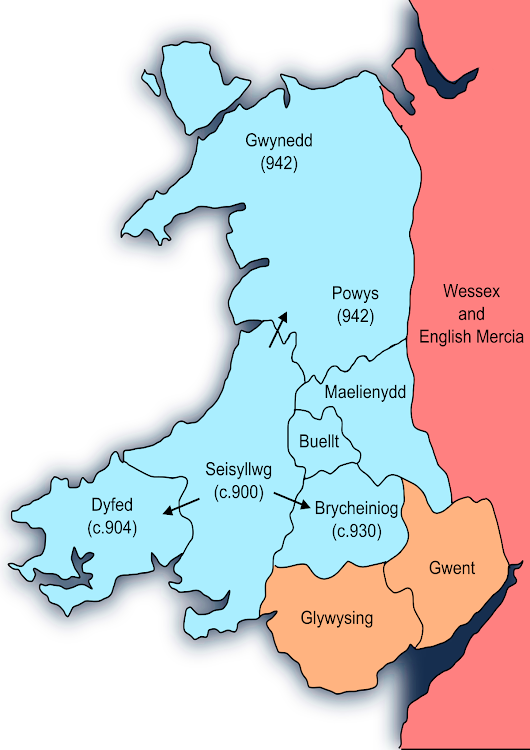https://en.wikipedia.org/wiki/Hywel_Dda
Coelwulf II of West Mercia versus Rhodri Mawr (Aberffraw) in 878 | Ingimundr versus Anarawd ap Rhodri in 902: King of Gwynedd (878-916)
Rhodri ap Merfyn
https://youtu.be/fbog7SIYsI8?t=12m22s
Rhodri ap Merfyn (c. 820–878), later known as Rhodri the Great (Welsh: Rhodri Mawr), succeeded his father, Merfyn Frych, as King of Gwynedd in 844. Rhodri annexed Powys c. 856 and Seisyllwg c. 871. He is called "King of the Britons" by the Annals of Ulster. In some later histories, he is referred to as "King of Wales", although the title is anachronistic and his realm did not include southern Wales.
https://en.wikipedia.org/wiki/Rhodri_the_Great
https://en.wikipedia.org/wiki/Rhodri_the_Great#/media/File:Wales_844-78_(Rhodri_the_Great).svg
https://en.wikipedia.org/wiki/Merfyn_Frych
https://en.wikipedia.org/wiki/Angharad_ferch_Meurig
https://en.wikipedia.org/wiki/Anarawd_ap_Rhodri
1066 Cas-gwent Chepstow
https://youtu.be/fbog7SIYsI8?t=25m5s
https://youtu.be/fbog7SIYsI8?t=29m33s
Rhys ap Gruffydd or ap Gruffudd (often anglicised to "Griffith") (1132 – 28 April 1197) was the ruler of the kingdom of Deheubarth in south Wales from 1155 to 1197. Today, he is commonly known as The Lord Rhys, in Welsh Yr Arglwydd Rhys, although this title may have not been used in his lifetime. He usually used the title "Proprietary Prince of Deheubarth" or "Prince of South Wales", but two documents have been discovered in which he uses the title "Prince of Wales" or "Prince of the Welsh". Rhys was one of the most successful and powerful Welsh princes, and, after the death of Owain Gwynedd of Gwynedd in 1170, the dominant power in Wales.
https://en.wikipedia.org/wiki/Rhys_ap_Gruffydd
https://youtu.be/fbog7SIYsI8?t=32m07s
Strata Florida
https://youtu.be/fbog7SIYsI8?t=39m17s
https://en.wikipedia.org/wiki/Rhys_ap_Gruffydd
https://youtu.be/fbog7SIYsI8?t=32m07s
Strata Florida
https://youtu.be/fbog7SIYsI8?t=39m17s
Llywelyn ap Gruffudd (c. 1223 – 11 December 1282), sometimes written as Llywelyn ap Gruffydd, also known as Llywelyn the Last, or, in Welsh, Llywelyn Ein Llyw Olaf ("Llywelyn, Our Last Leader"), was Prince of Wales (Latin: Princeps Wallie; Welsh: Tywysog Cymru) from 1258 until his death at Cilmeri in 1282. The son of Gruffudd ap Llywelyn Fawr and grandson of Llywelyn the Great, he was the last sovereign prince of Wales before its conquest by Edward I of England.
https://en.wikipedia.org/wiki/Llywelyn_ap_Gruffudd
https://en.wikipedia.org/wiki/Conquest_of_Wales_by_Edward_I_of_England
Gwenllian of Wales or Gwenllian ferch Llywelyn
https://youtu.be/fbog7SIYsI8?t=49m46s
https://en.wikipedia.org/wiki/Llywelyn_ap_Gruffudd
https://en.wikipedia.org/wiki/Conquest_of_Wales_by_Edward_I_of_England
Gwenllian of Wales or Gwenllian ferch Llywelyn
https://youtu.be/fbog7SIYsI8?t=49m46s
1349 - Great Pestilence - Black Death
https://youtu.be/fbog7SIYsI8?t=50m41s
https://youtu.be/fbog7SIYsI8?t=50m41s
1400 - Owain Glyndŵr
Owain Glyndŵr (Welsh pronunciation: [ˈoʊain ɡlɨ̞nˈduːr]; c. 1359 – c. 1415), or Owain Glyn Dŵr, was a Welsh ruler and the last native Welshman to hold the title Prince of Wales (Tywysog Cymru) but to many, viewed as an unofficial king. He instigated a fierce and long-running but ultimately unsuccessful revolt against the English rule of Wales.
*Story of Wales
https://www.youtube.com/watch?v=kETdr5KC7dw&list=PL8J9R3IV5p9K4tS6lTQ0fxXX6QyBsBf0t
http://www.anglo-saxons.net/hwaet/?do=show&page=Maps
Translate

